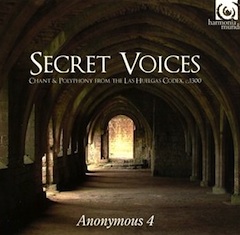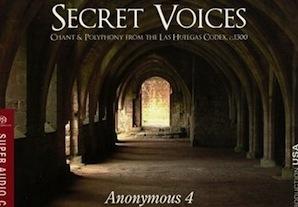
The vocal quartet Anonymous 4 spent most of its early career hovering around music of the 12th through 14th centuries, with more-recent forays into later music (shape-note singing and other American vernacular music, newly composed music). Here the quartet is back at the center of its old stomping-grounds, with selections from the Codex Las Huelgas.
The manuscript, though dating from the early 14th century, contains music a century older and more — much of it unique to this one manuscript, but much also found in other sources. It’s a fascinating mix of material, ranging from the simple to the intricate, the sober and straightforward to the outright playful. And it was compiled for the use of a group of cloistered Spanish women, many of them from aristocratic families.
Anonymous 4 has been criticized before for performing music that would, in its own time, have been sung only by men, and so devising a falsified musical history with an “authentic” gloss to it. Member Susan Hellauer’s program note makes a pugnacious case that it was the nuns themselves, not male clerics (who were, officially, the only ones allowed to sing sacred polyphony at the time), who used the Codex Las Huelgas. Her prize example is a solfeggio — that is, a piece meant to teach the singing syllables (“do,” “re,” “mi,” and so forth, though at the time what we call “do” was called “ut”). While running through the syllables, the piece incorporates Latin text, including lines Hellauer translates as “Sing out these and other things, you cloistered virgins, golden nuns.”
Listen To The Music
Fa fa mi / Ut re miMater patris et filia
Purchase Recording


A portion of each purchase helps
support San Francisco Classical Voice
The program is organized around the liturgical day of a 14th-century monastic, with a clutch of music for the Mass at its heart. The Mass texts are heavily troped — that is, interspersed in the canonical Latin text are other lines, mainly paeans to the Virgin. At its most elaborate (as in the Gloria performed here), this is seriously tricky music.
The motets and conductus also on the program, though, make even that sound easy. A “motet” at the time wasn’t a generic short sacred choral piece, as the word came to mean a couple of centuries later; it was a piece in multiple parts, each part with a different text, not necessarily sacred and not usually even all in the same language. (Listen to or download this free MP3 file.) “Conductus” was processional music, generally sung in a regular, walking-speed tempo, though otherwise not much like a march. Some of the ones here are positively frisky, like the setting of Mater patris et filia, whose latter part is full of hockets — places where one voice sits out so another can pop through.
If the nuns of Las Huelgas sang all this material, they must have had a thorough musical education, indeed.
It’s possibly my imagination (or the baleful influence of listening to too many Trio Mediaeval recordings), but the blend and intonation here are not quite what I remember from Anonymous 4’s earliest recordings. There are chords not hit entirely in tune, though they’re always quickly adjusted; and at places the internal balances seem momentarily out of whack. Don’t let that deter you, though: This is a marvelously varied, and savvy, selection from one of the great treasure-troves of 13th- and early 14th-century music, sung with obvious dedication, care, and love.

